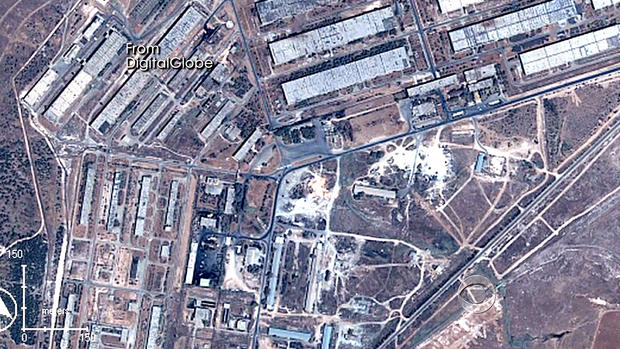Syria has likely used chemical weapons on a "small scale," Chuck Hagel says
Updated at 6:35 p.m. Eastern
ABU DHABI, United Arab Emirates U.S. intelligence has concluded "with some degree of varying confidence" that the Syrian government has twice used chemical weapons in its fierce civil war, the White House and other top administration officials said Thursday.
However, officials also said more definitive proof was needed and the U.S. was not ready to escalate its involvement in Syria. That response appeared to be an effort to bide time, given President Barack Obama's repeated public assertions that Syria's use of chemical weapons, or the transfer of its stockpiles to a terrorist group, would cross a "red line."
The White House disclosed the new intelligence Thursday in letters to two senators, and Defense Secretary Chuck Hagel, traveling in Abu Dhabi, also discussed it with reporters.
"Our intelligence community does assess, with varying degrees of confidence, that the Syrian regime has used chemical weapons on a small scale in Syria, specifically, the chemical agent sarin," the White House said in its letter, which was signed by Obama's legislative director, Miguel Rodriguez.
A top Syrian official in Damascus denied the allegations, telling CBS News' George Baghdadi that Syria does not even possess chemical weapons and if it did, "it will not use them."
Shortly after the letters was made public, Secretary of State John Kerry said on Capitol Hill that there were two instances of chemical weapons use. CBS News correspondent David Martin reports that both instances occurred last month; once near Damascus and once in Aleppo, where victims appeared to have gassed. Human tissue or blood samples showed symptoms consistent with the deadly nerve agent sarin, but the samples had passed through a number of different hands. As a result, U.S. intelligence had "low to moderate confidence" its judgment.
Hagel said the use of chemical weapons "violates every convention of warfare."
It was not immediately clear what quantity of weapons might have been used, or when or what casualties might have resulted.
In a conference call with reporters, a White House official stressed the administration was assessing information on Syria with caution to ensure the intelligence was "air tight."
"Given our own history with intelligence assessments, including intelligence assessments related to weapons of mass destruction, it's very important that we are able to establish this with certainty," the official said.
Mr. Obama has said the use of chemical weapons would be a "game-changer" in the U.S. position on intervening in the Syrian civil war, and the letter to Congress reiterated that the use or transfer of such weapons in Syria was a "red line for the United States." However, the letter also suggested a broad U.S. response was not imminent.
Asked if the new evidence means Syria had crossed the "red line," Hagel responded: "My role as secretary of defense is to give the president options on a policy issue - that's a policy issue. And we'll be prepared to do that as the president requires options."
Rodriguez wrote that "because the president takes this issue so seriously, we have an obligation to fully investigate any and all evidence of chemical weapons use within Syria."
The letter went to Sens. John McCain, R-Ariz., and Carl Levin, D-Mich. Levin said the letters sent Thursday were a response to a request the day before for an unclassified response to what the administration knows about chemical weapons in Syria.
The assessment, Rodriguez said, was based in part on "physiological samples."
- Kerry: NATO needs plan for Syrian chemical weapons
- Israel: Syria used chemical weapons, several times
- Is the "red line" on Syria's chemical weapons blurring?
The letter also said the U.S. believes the use of chemical weapons "originated with the Assad regime." That is consistent with the Obama administration's assertion that the Syrian rebels do not have access to the country's stockpiles.
A senior defense official cautioned that the White House letter was not an "automatic trigger" for policy decisions on the use of military force. The official alluded to past instances of policy decisions that were based on what turned out to be flawed intelligence, such as the Bush administration's decision to invade Iraq after concluding that Saddam Hussein had weapons of mass destruction, including nuclear weapons.
The official commented only on condition of anonymity because he was not authorized to speak publicly.
McCain quoted from the letter in making his own comments to reporters on Capitol Hill.
"We just received a letter from the president in response to our question about whether Assad had used chemical weapons," McCain said following a closed briefing with Kerry on Syria and North Korea.
Meanwhile, Britain's Foreign Office said it had "limited but persuasive" information showing chemical weapon use in Syria, Reuters reported.
French officials told CBS News that they are "taking very seriously" the allegations of chemical weapons use in Syria but the French government still does not have evidence to confirm the report.
"The main challenge is to go from clues to proofs and from proofs to accountability," a French diplomat told CBS News.
Last month, Syria expert Salman Shaikh, director of the Brookings Institution's Doha Center,told CBSNews.com that the government has been "experimenting with various compounds and mixtures to see how they could use these (chemical agents) in a localized fashion."
Shaikh said his sources, who travel to and from Damascus and maintain contact with both current and former regime officials, are certain that Assad's regime has tried out less lethal, less widely dispersed compounds for months.
